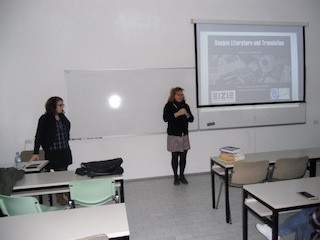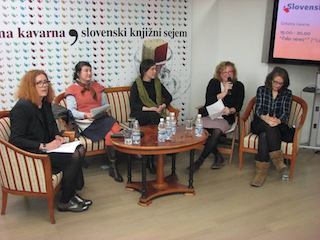2017: Conversations in Slovenia
Building on last years New Translators program, two representatives of EIZIE (Euskal Itzultzaile, Zuzentzaile eta Interpreteen Elkartea, the Association of Translators, Correctors and Interpreters of the Basque Language) traveled to Slovenia this year to take part in discussions about the spread of Basque culture and translation.
In collaboration with the Etxepare Basque Institute, Elizabete Manterola Agirrezabala and Arantzazu Royo Manterola participated in a number of activities that took place in Ljubljana and Nova Gorica from November 21 to 24, 2017, together with Slovenian translator, editor, and professor Barbara Pregelj, who is one of the new translators.

Their first talk was hosted by the Department of Philosophy at the University of Ljubljana for students and professors of Spanish. Next, they gave two more lectures at the University of Nova Gorica, in the Department of Humanities, for students and professors of world literature and comparative literature. Elizabete Manterola Agirrezabala spoke about the importance of translation in the development of Basque culture and especially of Basque literature, sparking interesting discussion of the topic.

In addition to these lectures at the two universities, the representatives of EIZIE also participated in a roundtable discussion at the Ljubljiana Book Fair on November 23, together with representatives of the Slovenian Association of Literary Translators (DSKP). Barbara Pregelj served as moderator and interpreter. The participants discussed literary translation in general, and shared their thoughts about the social and economic situation of professional translators in various countries: Slovenia (discussion led by Ðurđa Strsoglavec), Germany and Switzerland (Urka P. Černe), and the Basque Country (representatives of EIZIE).
Topics
Among the topics under discussion were the sociolinguistic situation in the Basque Country, and the presence (or absence) of the Basque language in different cultural spheres. Additionally, speakers revisited the definition of minority language and examined the differences between minoritization and diglossia. Another theme was the importance of translation in the development of Basque culture and especially of Basque literature, including an analysis of the differences between translating from and into Basque, as well as of variations that may arise as a function of the different cultural areas or literary genres being translated (among translations into Basque, for example, childrens and young peoples literature holds a special place). Translation between Basque and Slovenian was also discussed, focusing on what relationships have been established and could be established between these two languages, which, despite their geographical distance from each other, nevertheless share the status of "small language" in number of speakers. All participants agreed on the importance of continuing to promote translation.



